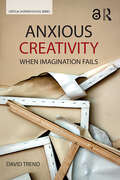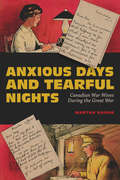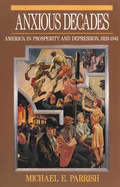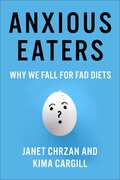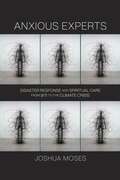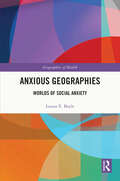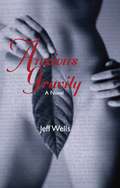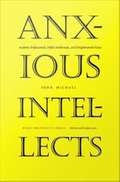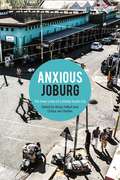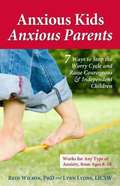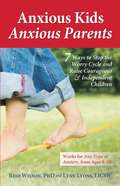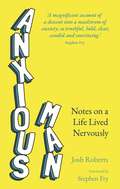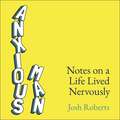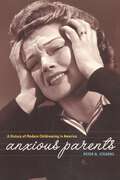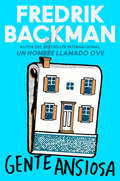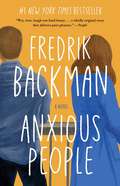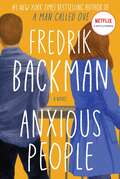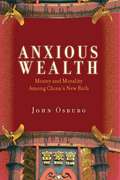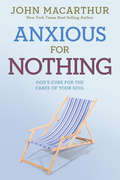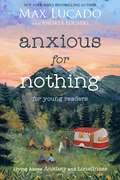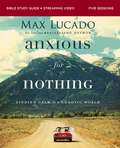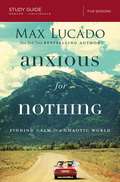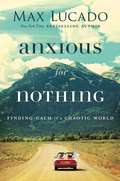- Table View
- List View
Anxious Creativity: When Imagination Fails (Critical Interventions)
by David TrendCreativity is getting new attention in today’s America––along the way revealing fault lines in U.S. culture. Surveys show people overwhelmingly seeing creativity as both a desirable trait and a work enhancement, yet most say they just aren’t creative. Like beauty and wealth, creativity seems universally desired but insufficiently possessed. Businesses likewise see innovation as essential to productivity and growth, but can’t bring themselves to risk new ideas. Even as one’s "inner artist" is hyped by a booming self-help industry, creative education dwindles in U.S. schools. Anxious Creativity: When Imagination Fails examines this conceptual mess, while focusing on how America’s current edginess dampens creativity in everyone. Written in an engaging and accessible style, Anxious Creativity draws on current ideas in the social sciences, economics, and the arts. Discussion centers on the knotty problem of reconciling the expressive potential in all people with the nation’s tendency to reward only a few. Fortunately, there is some good news, as scientists, economists, and creative professionals have begun advocating new ways of sharing and collaboration. Building on these prospects, the book argues that America’s innovation crisis demands a rethinking of individualism, competition, and the ways creativity is rewarded.
Anxious Days and Tearful Nights: Canadian War Wives During the Great War (Carleton Library Series #252)
by Martha HannaWhat was it like to be a soldier's wife in Canada during the First World War? More than 80,000 Canadian women were married to men who left home to fight in the war, and its effects on their lives were transformative and often traumatic. Yet the everyday struggles of Canadian war wives, lived far from the battlefields of France, have remained in the shadows of historical memory. Anxious Days and Tearful Nights highlights how Canadian women's experiences of wartime marital separation resembled and differed from those of their European counterparts. Drawing on the letters of married couples separated by wartime service and the military service records of hundreds of Canadian soldiers, Martha Hanna reveals how couples used correspondence to maintain the routine and the affection of domestic life. She explores how women managed households and budgets, how those with children coped with the challenges of what we today would call single parenthood, and when and why some war wives chose to relocate to Britain to be nearer to their husbands. More than anything else, the life of a war wife - especially a war wife separated from her husband for years on end - was marked and marred by unrelieved psychological stress. Through this close personal lens Hanna reveals a broader picture of how war's effects persist across time and space.
Anxious Decades: America in Prosperity and Depression, 1920-1941
by Michael E. Parrish"Impressively detailed. . . . An authoritative and epic overview."—Publishers Weekly In the convulsive years between 1920 and 941, Americans were first dazzled by unprecedented economic prosperity and then beset by the worst depression in their history. It was the era of Model T's, rising incomes, scientific management, electricity, talking movies, and advertising techniques that sold a seemingly endless stream of goods. But is was also a time of grave social conflict and human suffering. The Crash forced Hoover, and then Roosevelt and the nation, to reexamine old solutions and address pressing questions of recovery and reform, economic growth and social justice. The world beyond America changed also in these years, making the country rethink its relation to events in Europe, Latin America, and Asia. The illusion of superiority slowly died in the 1930s, sustaining a fatal blow in December 1941 at Pearl Harbor.
Anxious Eaters: Why We Fall for Fad Diets (Arts and Traditions of the Table: Perspectives on Culinary History)
by Janet Chrzan Kima CargillWhat makes fad diets so appealing to so many people? How did there get to be so many different ones, often with eerily similar prescriptions? Why do people cycle on and off diets, perpetually searching for that one simple trick that will solve everything? And how did these fads become so central to conversations about food and nutrition?Anxious Eaters shows that fad diets are popular because they fulfill crucial social and psychological needs—which is also why they tend to fail. Janet Chrzan and Kima Cargill bring together anthropology, psychology, and nutrition to explore what these programs promise yet rarely fulfill for dieters. They demonstrate how fad diets help people cope with widespread anxieties and offer tantalizing glimpses of attainable self-transformation. Chrzan and Cargill emphasize the social contexts of diets, arguing that beliefs about nutrition are deeply rooted in pervasive cultural narratives. Although people choose to adopt new eating habits for individual reasons, broader forces shape why fad diets seem to make sense.Considering dietary beliefs and practices in terms of culture, nutrition, and individual psychological needs, Anxious Eaters refrains from moralizing or promoting a “right” way to eat. Instead, it offers new ways of understanding the popularity of a wide range of eating trends, including the Atkins Diet and other low- or no-carb diets; beliefs that ingredients like wheat products and sugars are toxic, allergenic, or addictive; food avoidance and “Clean Eating” practices; and paleo or primal diets. Anxious Eaters sheds new light on why people adopt such diets and why these diets remain so attractive even though they often fail.
Anxious Experts: Disaster Response and Spiritual Care from 9/11 to the Climate Crisis (Critical Studies in Risk and Disaster)
by Joshua MosesIn this age of near-perpetual disaster, from the Coronavirus epidemic and mass incarceration to hurricanes and earthquakes, spiritual care has become an essential component of the disaster-response toolkit. In Experts in the Age of Anxiety, Joshua Moses chronicles the rise of disaster-related spiritual expertise in the years following the attacks of 9/11. What emerges are approaches to trauma that encompass everything from meditation and acupuncture to trauma therapy and restorative justice. In this way, the ascent of spiritual expertise in response to post-9/11 disasters represents an extension of historical tensions between secular health practice and proponents of religious and spiritual care.The book also provides a lens through which to understand the historical dimensions of disaster-related trauma, its treatment, and the ways that therapeutic and spiritual practices imply politics. By studying the intersection of mental health and spirituality in the context of disaster, we gain essential insight into apocalyptic and dystopic beliefs that are prevalent today throughout the United States—and beyond. We learn not only about the role of particular forms of expertise in defining meaning but also the consequences this concept of meaning may have for how we imagine our relations to other humans and nonhumans, the climate crisis—and ultimately the kind of future we might imagine.This variety of therapeutic and spiritual practices, now deployed in the face of disaster, will be tested as humanity faces growing threats from the climate crisis and other cascading disasters. But it is not at all clear whether the particular kinds of knowledge we have managed to patch together will provide the resources we require to instill the capacities to face the repercussions of future disasters.
Anxious Geographies: Worlds of Social Anxiety (ISSN)
by Louise E. BoyleAnxious Geographies offers a unique perspective on social anxiety, framing it as both a social and spatial phenomenon. Through a meticulous exploration using online questionnaires and interviews, the book provides a crucial examination of the intricacies of anxious lives.This book presents a critical intervention in the experience of mental health in 21st-century society and provides a compelling geographical account of the underpinnings of the anxious experience. The book pivots on the in-depth perspectives of people with social anxiety, diagnosed or “sub-clinical”, but with an academic commentary that relates their experience to the medicalisation of a disrupted relational life, offering lessons for all of us in modern societies. Each chapter considers a unique aspect of social anxiety accounting for the social, spatial, temporal, relational and embodied dynamics, a geographical approach that enriches our understanding of the contexts and conditions that exacerbate and sustain anxious distress. The phenomenological descriptions herein, capture how social anxiety can profoundly alter a person’s coherent, habitual and embodied sense of being in and navigating through their social and spatial worlds. Through the experiential accounts of anxious distress and by considering the social contexts in which they emerge, this book provides readers with crucial insights into the hidden lives of those living with social anxiety.This book will be of appeal to academics, researchers and postgraduate students in the fields of human geography and across the social sciences and humanities. It will also provide useful insights for academics and health professionals in social psychiatry, social psychology, counselling studies and therapeutic practice.
Anxious Gravity: A Novel
by Jeff WellsThe life of a naive, born-again teen can sometimes seem God-awful, as Gideon discovers at Overcomer Bible Institute. Having given himself over to religion, Gideon quickly finds his newfound faith challenged by sexually aggressive women, a disturbed student armed with a power drill, and Siamese-twin evangelists. A satiric look at the religious and secular worlds, Anxious Gravity succeeds at the daunting task of being both thoughtful and wildly entertaining. "Jeff Wells is the most consistently funny humorist in Canada today." -Michael Bate, Editor-in-Chief, Frank
Anxious Intellects: Academic Professionals, Public Intellectuals, and Enlightenment Values
by John MichaelIntellectuals occupy a paradoxical position in contemporary American culture as they struggle both to maintain their critical independence and to connect to the larger society. In Anxious Intellects John Michael discusses how critics from the right and the left have conceived of the intellectual's role in a pluralized society, weighing intellectual authority against public democracy, universal against particularistic standards, and criticism against the respect of popular movements. Michael asserts that these Enlightenment-born issues, although not "resolvable," are the very grounds from which real intellectual work must proceed. As part of his investigation of intellectuals' self-conceptions and their roles in society, Michael concentrates on several well-known contemporary African American intellectuals, including Henry Louis Gates Jr. and Cornel West. To illuminate public debates over pedagogy and the role of university, he turns to the work of Todd Gitlin, Michael Brub, and Allan Bloom. Stanley Fish's pragmatic tome, Doing What Comes Naturally, along with a juxtaposition of Fredric Jameson and Samuel Huntington's work, proves fertile ground for Michael's argument that democratic politics without intellectuals is not possible. In the second half of Anxious Intellects, Michael relies on three popular conceptions of the intellectual--as critic, scientist, and professional--to discuss the work of scholars Constance Penley, Henry Jenkins, the celebrated physicist Stephen Hawking, and others, insisting that ambivalence, anxiety, projection, identification, hybridity, and various forms of psychosocial complexity constitute the real meaning of Enlightenment intellectuality. As a new and refreshing contribution to the recently emergent culture and science wars, Michael's take on contemporary intellectuals and their place in society will enliven and redirect these ongoing debates.
Anxious Joburg: The inner lives of a global South city
by Nicky Falkof, Cobus van StadenAn interdisciplinary account of the life of Johannesburg, South Africa's "global south city"Anxious Joburg focuses on Johannesburg, the largest and wealthiest city in South Africa, as a case study for the contemporary global South city. Global South cities are often characterised as sites of contradiction and difference that produce a range of feelings around anxiety. This is often imagined in terms of the global North’s anxieties about the South: migration, crime, terrorism, disease and environmental crisis. Anxious Joburg invites readers to consider an intimate perspective of living inside such a city. How does it feel to live in the metropolis of Johannesburg: what are the conditions, intersections, affects and experiences that mark the contemporary urban?Scholars, visual artists and storytellers, all look at unexamined aspects of Johannesburg life. From peripheral settlements to the inner city to the affluent northern suburbs, from precarious migrants and domestic workers to upwardly mobile young women and fearful elites, Anxious Joburg presents an absorbing engagement with this frustrating, dangerous, seductive city. It offers a rigorous, critical approach to Johannesburg revealing the way in which anxiety is a vital structuring principle of contemporary life.The approach is strongly interdisciplinary, with contributions from media studies, anthropology, religious studies, urban geography, migration studies and psychology. It will appeal to students and teachers, as well as to academic researchers concerned with Johannesburg, South Africa, cities and the global South. The mix of approaches will also draw a non-academic audience.
Anxious Kids, Anxious Parents: 7 Ways To Stop the Worry Cycle and Raise Courageous and Independent Children
by Reid Wilson Lynn LyonsWith anxiety at epidemic levels among our children, Anxious Kids, Anxious Parents offers a contrarian yet effective approach to help children and teens push through their fears, worries, and phobias to ultimately become more resilient, independent, and happy. <p>How do you manage a child who gets stomachaches every school morning, who refuses after-school activities, or who is trapped in the bathroom with compulsive washing? Children like these put a palpable strain on frustrated, helpless parents and teachers. And there is no escaping the problem: One in every five kids suffers from a diagnosable anxiety disorder. Unfortunately, when parents or professionals offer help in traditional ways, they unknowingly reinforce a child's worry and avoidance. From their success with hundreds of organizations, schools, and families, Reid Wilson, PhD, and Lynn Lyons, LICSW, share their unconventional approach of stepping into uncertainty in a way that is currently unfamiliar but infinitely successful. Using current research and contemporary examples, the book exposes the most common anxiety-enhancing patterns—including reassurance, accommodation, avoidance, and poor problem solving—and offers a concrete plan with 7 key principles that foster change. And, since new research reveals how anxious parents typically make for anxious children, the book offers exercises and techniques to change both the children's and the parental patterns of thinking and behaving. <p>This book challenges our basic instincts about how to help fearful kids and will serve as the antidote for an anxious nation of kids and their parents.
Anxious Kids, Anxious Parents: 7 Ways to Stop the Worry Cycle and Raise Courageous and Independent Children
by Lynn Lyons Dr. Reid WilsonWith anxiety at epidemic levels among our children, Anxious Kids, Anxious Parents offers a contrarian yet effective approach to help children and teens push through their fears, worries, and phobias to ultimately become more resilient, independent, and happy.How do you manage a child who gets stomachaches every school morning, who refuses after-school activities, or who is trapped in the bathroom with compulsive washing? Children like these put a palpable strain on frustrated, helpless parents and teachers. And there is no escaping the problem: One in every five kids suffers from a diagnosable anxiety disorder. Unfortunately, when parents or professionals offer help in traditional ways, they unknowingly reinforce a child's worry and avoidance. From their success with hundreds of organizations, schools, and families, Reid Wilson, PhD, and Lynn Lyons, LICSW, share their unconventional approach of stepping into uncertainty in a way that is currently unfamiliar but infinitely successful. Using current research and contemporary examples, the book exposes the most common anxiety-enhancing patterns—including reassurance, accommodation, avoidance, and poor problem solving—and offers a concrete plan with 7 key principles that foster change. And, since new research reveals how anxious parents typically make for anxious children, the book offers exercises and techniques to change both the children's and the parental patterns of thinking and behaving. This book challenges our basic instincts about how to help fearful kids and will serve as the antidote for an anxious nation of kids and their parents.
Anxious Man: Notes on a life lived nervously
by Josh Roberts"So truthful, bold, clear, candid and convincing that I read it in one breathless sitting" Stephen FryOne night three years ago Josh Roberts went to a party. The next morning he awoke to discover his mind had collapsed.In a matter of days he went from being a fun loving, seemingly successful twenty-something to a hot mess of tears and nerves. Eventually he was diagnosed with Generalised Anxiety Disorder (GAD). Since then, he's been mending his mind, rediscovering happiness and learning to live his nervous life. Anxious Man is the story of all this.Told with originality, wit and great humour, it's an essential guide for mental health and a thought-provoking exploration of the millennial condition.***************"The best book I have ever written" Josh Roberts (debut author of Anxious Man)"Yep, fine" Cali Mackrill (girlfriend of author of Anxious Man)"Have you seen my scissors?" Vicky Roberts (mother of author of Anxious Man)
Anxious Man: Notes on a life lived nervously
by Josh Roberts"So truthful, bold, clear, candid and convincing that I read it in one breathless sitting" Stephen FryOne night three years ago Josh Roberts went to a party. The next morning he awoke to discover his mind had collapsed.In a matter of days he went from being a fun loving, seemingly successful twenty-something to a hot mess of tears and nerves. Eventually he was diagnosed with Generalised Anxiety Disorder (GAD). Since then, he's been mending his mind, rediscovering happiness and learning to live his nervous life. Anxious Man is the story of all this.Told with originality, wit and great humour, it's an essential guide for mental health and a thought-provoking exploration of the millennial condition.***************"The best book I have ever written" Josh Roberts (debut author of Anxious Man)"Yep, fine" Cali Mackrill (girlfriend of author of Anxious Man)"Have you seen my scissors?" Vicky Roberts (mother of author of Anxious Man)'This is a funny, refreshingly jargon free book.' Daily Mail
Anxious Man: Notes on a life lived nervously
by Josh Roberts"So truthful, bold, clear, candid and convincing that I read it in one breathless sitting" Stephen FryOne night three years ago Josh Roberts went to a party. The next morning he awoke to discover his mind has collapsed.In a matter of days he went from being a fun loving, seemingly successful twenty-something to a hot mess of tears and nerves. Eventually he was diagnosed with Generalised Anxiety Disorder (GAD). Since then, he's been mending his mind, rediscovering happiness and learning to live his nervous life. Anxious Man is the story of all this.Told with originality, wit and great humour, it's an essential guide for mental health and a thought-provoking exploration of the millennial condition.***************"The best book I have ever written" Josh Roberts (debut author of Anxious Man)"Yep, fine" Cali Mackrill (girlfriend of author of Anxious Man)"Have you seen my scissors?" Vicky Roberts (mother of author of Anxious Man)(P) 2020 Hodder & Stoughton Ltd
Anxious Parents: A History of Modern Childrearing in America
by Peter N. StearnsAn examination into the history of modern parentingThe nineteenth and twentieth centuries saw a dramatic shift in the role of children in American society and families. No longer necessary for labor, children became economic liabilities and twentieth-century parents exhibited a new level of anxiety concerning the welfare of their children and their own ability to parent effectively. What caused this shift in the ways parenting and childhood were experienced and perceived? Why, at a time of relative ease and prosperity, do parents continue to grapple with uncertainty and with unreasonable expectations of both themselves and their children? Peter N. Stearns explains this phenomenon by examining the new issues the twentieth century brought to bear on families. Surveying popular media, "expert” childrearing manuals, and newspapers and journals published throughout the century, Stearns shows how schooling, physical and emotional vulnerability, and the rise in influence of commercialism became primary concerns for parents. The result, Stearns shows, is that contemporary parents have come to believe that they are participating in a culture of neglect and diminishing standards. Anxious Parents: A Modern History of Childrearing in America shows the reasons for this belief through an historic examination of modern parenting.
Anxious People \ Gente ansiosa (Spanish edition)
by Fredrik BackmanUn robo a un banco con toma de rehenes. Una escalera llena de policías a punto de asaltar un apartamento. Llegar a esto fue sorprendentemente fácil. Sólo hizo falta una mala idea. Una idea mala de verdad.Visitar un apartamento en venta no es una situación de vida o muerte. A menos que sea la víspera de Nochevieja, vivas en una pequeña ciudad en Suecia y alguien haya tenido la peor idea de su vida y decidido atracar un banco que no maneja efectivo. Entonces, sí lo es. Porque, cuando alguien es así de idiota, es inevitable que no sepa cómo huir y termine en un apartamento en venta tomando rehenes sin querer.Pero puedes confiar en la policía. A menos que los dos agentes encargados del caso no se entiendan entre ellos y tengan cero experiencia con tomas de rehenes. Entonces, no.Aunque todo irá bien si los rehenes mantienen la calma. A menos que sean los peores rehenes de la historia: una millonaria suicida, una anciana encantadora, un matrimonio de jubilados amantes de IKEA, dos recién casadas que nunca se ponen de acuerdo, una agente inmobiliaria excesivamente entusiasta y un hombre disfrazado de conejo. Entonces, no, porque, cuando todos son idiotas, es imposible mantener la calma. Sin embargo, policías y rehenes están a punto de descubrir que quizá ser idiota no está tan mal y que, a veces, la ansiedad puede ser la solución.En Gente ansiosa se dan cita todos los elementos del universo de Fredrik Backman, habitado por personajes tan imperfectos como enternecedores, y teñido de un sentido del humor inimitable, mezcla de ironía y compasión, que ha cautivado a millones de lectores de todo el mundo.FREDRIK BACKMAN es autor de nueve libros, entre ellos el bestseller internacional Un hombre llamado Ove, cuya versión cinematográfica fue candidata a dos Óscar. Sus obras se han traducido a cuarenta y seis idiomas. Gente ansiosa se convertirá en una serie de Netflix en 2022. Backman vive en Estocolmo con su esposa y sus dos hijos.
Anxious People: A Novel
by Fredrik BackmanAn instant #1 New York Times bestseller, the new novel from the author of A Man Called Ove is a &“quirky, big-hearted novel….Wry, wise, and often laugh-out-loud funny, it&’s a wholly original story that delivers pure pleasure&” (People).Looking at real estate isn&’t usually a life-or-death situation, but an apartment open house becomes just that when a failed bank robber bursts in and takes a group of strangers hostage. The captives include a recently retired couple who relentlessly hunt down fixer-uppers to avoid the painful truth that they can&’t fix their own marriage. There&’s a wealthy bank director who has been too busy to care about anyone else and a young couple who are about to have their first child but can&’t seem to agree on anything. Add to the mix an eighty-seven-year-old woman who has lived long enough not to be afraid of someone waving a gun in her face, a flustered but still-ready-to-make-a-deal real estate agent, and a mystery man who has locked himself in the apartment&’s only bathroom, and you&’ve got the worst group of hostages in the world. Each of them carries a lifetime of grievances, hurts, secrets, and passions that are ready to boil over. None of them is entirely who they appear to be. And all of them—the bank robber included—desperately crave some sort of rescue. As the authorities and the media surround the premises, these reluctant allies will reveal surprising truths about themselves and set in motion a chain of events so unexpected that even they can hardly explain what happens next. Proving once again that Backman is &“a master of writing delightful, insightful, soulful, character-driven narratives&” (USA TODAY), Anxious People &“captures the messy essence of being human….It&’s clever and affecting, as likely to make you laugh out loud as it is to make you cry&” (The Washington Post). This &“endlessly entertaining mood-booster&” (Real Simple) is proof that the enduring power of friendship, forgiveness, and hope can save us—even in the most anxious of times.
Anxious People: A Novel
by Fredrik Backman#1 New York Times bestseller From the #1 New York Times bestselling author of A Man Called Ove and &“writer of astonishing depth&” (The Washington Times) comes a poignant comedy about a crime that never took place, a would-be bank robber who disappears into thin air, and eight extremely anxious strangers who find they have more in common than they ever imagined.Viewing an apartment normally doesn&’t turn into a life-or-death situation, but this particular open house becomes just that when a failed bank robber bursts in and takes everyone in the apartment hostage. As the pressure mounts, the eight strangers begin slowly opening up to one another and reveal long-hidden truths. First is Zara, a wealthy bank director who has been too busy to care about anyone else until tragedy changed her life. Now, she&’s obsessed with visiting open houses to see how ordinary people live—and, perhaps, to set an old wrong to right. Then there&’s Roger and Anna-Lena, an Ikea-addicted retired couple who are on a never-ending hunt for fixer-uppers to hide the fact that they don&’t know how to fix their own failing marriage. Julia and Ro are a young lesbian couple and soon-to-be parents who are nervous about their chances for a successful life together since they can&’t agree on anything. And there&’s Estelle, an eighty-year-old woman who has lived long enough to be unimpressed by a masked bank robber waving a gun in her face. And despite the story she tells them all, Estelle hasn&’t really come to the apartment to view it for her daughter, and her husband really isn&’t outside parking the car. As police surround the premises and television channels broadcast the hostage situation live, the tension mounts and even deeper secrets are slowly revealed. Before long, the robber must decide which is the more terrifying prospect: going out to face the police, or staying in the apartment with this group of impossible people. Rich with Fredrik Backman&’s &“pitch-perfect dialogue and an unparalleled understanding of human nature&” (Shelf Awareness), Anxious People&’s whimsical plot serves up unforgettable insights into the human condition and a gentle reminder to be compassionate to all the anxious people we encounter every day.
Anxious Politics
by Bethany Albertson Gadarian Shana KushnerEmotions matter in politics - enthusiastic supporters return politicians to office, angry citizens march in the streets, a fearful public demands protection from the government. Anxious Politics explores the emotional life of politics, with particular emphasis on how political anxieties affect public life. When the world is scary, when politics is passionate, when the citizenry is anxious, does this politics resemble politics under more serene conditions? If politicians use threatening appeals to persuade citizens, how does the public respond? Anxious Politics argues that political anxiety triggers engagement in politics in ways that are potentially both promising and damaging for democracy. Using four substantive policy areas (public health, immigration, terrorism, and climate change), the book seeks to demonstrate that anxiety affects how we consume political news, who we trust, and what politics we support. Anxiety about politics triggers coping strategies in the political world, where these strategies are often shaped by partisan agendas.
Anxious Wealth
by John OsburgWho exactly are China's new rich? This pioneering investigation introduces readers to the private lives--and the nightlives--of the powerful entrepreneurs and managers redefining success and status in the city of Chengdu. Over the course of more than three years, anthropologist John Osburg accompanied, and in some instances assisted, wealthy Chinese businessmen as they courted clients, partners, and government officials. Drawing on his immersive experiences, Osburg invites readers to join him as he journeys through the new, highly gendered entertainment sites for Chinese businessmen, including karaoke clubs, saunas, and massage parlors--places specifically designed to cater to the desires and enjoyment of elite men. Within these spaces, a masculinization of business is taking place. Osburg details the complex code of behavior that governs businessmen as they go about banqueting, drinking, gambling, bribing, exchanging gifts, and obtaining sexual services. These intricate social networks play a key role in generating business, performing social status, and reconfiguring gender roles. But many entrepreneurs feel trapped by their obligations and moral compromises in this evolving environment. Ultimately, Osburg examines their deep ambivalence about China's future and their own complicity in the major issues of post-Mao Chinese society--corruption, inequality, materialism, and loss of trust.
Anxious for Nothing
by John Macarthur Jr.Stress has become part of our daily lives. We worry about our jobs, our relationships, and our families. And while there's no lack of remedies for anxiety, no solution seems to offer true peace of mind.John MacArthur, Jr. believes that peace is not only possible, it's a divine mandate. Drawing from a rich legacy of teaching and ministry, MacArthur puts aside cultural cures to uncover the source of our anxiety and stress. Based on solid Biblical insights, Anxious for Nothing shares how we can overcome uncertainty, defeat doubt, and be truly worry-free.This revised and updated edition includes a guide for both personal and group study and features discovery questions, suggestions for prayer, and activities, all designed to connect life-changing truths with everyday living.
Anxious for Nothing (Young Readers Edition): Living Above Anxiety and Loneliness
by Max LucadoOur kids are under tremendous stress and pressure, with a rapidly changing culture demanding more and more from them. More attention, more screens, more intensity, more fear. Anxious for Nothing helps young people overcome the anxiety and pressures of today's world and come to a deeper understanding of God's loving presence as promised in Philippians 4:6-7, drawing on content from Max Lucado&’s bestselling book of the same name. In this chaotic age of social media, packed schedules, and an increasing awareness of the world's problems, it's normal for young people to feel overwhelmed sometimes. But the good news of the gospel has not changed. This encouraging book will help tweens and teens take control of their feelings and choose to focus on God's truth. This much-needed book adapts content from You Are Not Alone and Anxious for Nothing. With the warmth and authenticity that has made him a beloved pastor and writer, Max Lucado middle graders and tweens: biblical hope and powerful strategies to help them flourish amidst strugglesencouragement that God is near, He cares, and He listens truths to claim for themselves in difficult moments practical ways to work through their worries and rely on God's faithfulness This special edition of Anxious for Nothing also includes: a note to kids from author Max Lucado application questions, journal prompts, and activities that guide kids in Christ-focused mindfulness<span data-ccp-props="{"201341983":0,"335559685":1320
Anxious for Nothing Bible Study Guide plus Streaming Video, Updated Edition: Finding Calm in a Chaotic World
by Max LucadoGod Has a Cure for Your WorriesDo you feel weighed down with worry? Does the uncertainty and chaos of life keep you up at night? Are irrational fears your constant companion? Could you just use some calm?In this five-session video Bible study (video access included), bestselling author Max Lucado explores God's treatment plan for anxiety found in Philippians 4:4–8. As you follow this prescription—celebrating God's goodness, asking for his help, leaving your concerns with him, and meditating on good things—you will experience God's peace. This is a peace that "transcends all understanding" and will help you reframe the way you look at your fears.While anxiety is a part of life, it doesn't have to dominate your life. You can talk yourself off the ledge and view bad news through the lens of God's sovereignty.This study guide includes:Individual access to five streaming video sessionsVideo notes and a comprehensive structure for group discussion timePersonal study for deeper reflection between sessionsA guide to best practices for leading a groupStreaming video access included. Access code subject to expiration after 12/31/2029. Code may be redeemed only by the recipient of this package. Code may not be transferred or sold separately from this package. Internet connection required. Void where prohibited, taxed, or restricted by law. Additional offer details inside.
Anxious for Nothing Study Guide: Finding Calm in a Chaotic World
by Max LucadoDo you feel weighted down with worry? Does the uncertainty and chaos of life keep you up at night? Are irrational fears your constant companion? Could you use some calm?In this five-session video Bible study, bestselling author Max Lucado explores God’s treatment plan for anxiety found in Philippians 4:4–8. As you follow this prescription – celebrating God’s goodness, asking for his help, leaving your concerns with him, and meditation on good things – you will experience God’s peace. This is a peace that “transcends all understanding” and will help you reframe the way you look at your fears.While anxiety is a part of life, it doesn’t have to dominate your life. With God as your helper and his promises at your side, you can sleep better tonight and smile more tomorrow. You can talk yourself off the ledge and view bad news through the lens of God’s sovereignty. You can discover a life of calm and develop tools for combating the onslaught of anxiety.The Anxious for Nothing Study Guide includes video discussion questions, Bible exploration, and personal study and reflection materials for in-between sessions.Sessions include:Rejoice in the Lord AlwaysLet Your Gentleness Be Evident to AllPresent Your Requests to GodThe Peace of God Will Guard Your HeartMeditate on These ThingsDesigned for use with the Anxious for Nothing Video Study (sold separately).
Anxious for Nothing: Finding Calm in a Chaotic World
by Max LucadoWhen it comes to anxiety, depression, and stress-related illnesses, America is the frontrunner. Thankfully, there’s a practical prescription for dealing with them. Anxious for Nothing, the most recent book from New York Times bestselling author, Max Lucado, provides a roadmap for battling with and healing from anxiety. Does the uncertainty and chaos of life keep you up at night?Is irrational worry your constant companion?Could you use some calm?If the answer is yes, you are not alone. According to one research program, anxiety-related issues are the number one mental health problem among women and are second only to alcohol and drug abuse among men. Stress-related ailments cost the nation $300 billion every year in medical bills and lost productivity. And use of sedative drugs like Xanax and Valium have skyrocketed in the last 15 years. Even students are feeling it. One psychologist reports that the average high school kid today has the same level of anxiety as the average psychiatric patient in the early 1950s. Chances are, you or someone you know seriously struggles with anxiety.Max writes, "The news about our anxiety is enough to make us anxious.” He knows what it feels like to be overcome by the worries and fear of life, which is why he is dedicated to helping millions of readers take back control of their minds and, as a result, their lives.Anxious for Nothing invites readers to delve into Philippians 4:6-7. After all, it is the most highlighted passage of any book on the planet, according to Amazon:Do not be anxious about anything, but in every situation, by prayer and petition, with thanksgiving, present your requests to God. And the peace of God, which transcends all understanding, will guard your hearts and your minds in Christ Jesus.In the characteristic tone of his previous books like You’ll Get Through This and Fearless, Max guides readers through this Scripture passage and explains the key concepts of celebration, asking for help, leaving our concerns, and meditating.Stop letting anxiety rule the day. Join Max on the journey to true freedom and experience more joy, clarity, physical renewal, and contentment by the power of the Holy Spirit. Anxiety comes with life. But it doesn't have to dominate your life.
